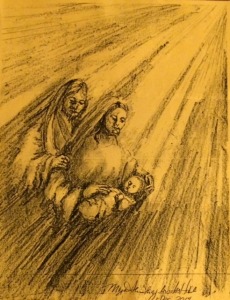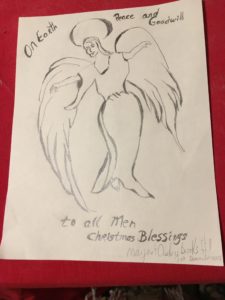Readings: Psalm 125; Malachi 3:16-4:6; Mark 9:9-13
I have attended church almost every Sunday of my remembered life.
I love the church, the quietness of the space and the holiness of the environments I have been part of throughout the different stages of my life. In each of these church experiences I had my pre-conceived idea of who Jesus was based on the experiences of my life beforehand and what I had been taught and had been willing to take the time to study.
(In the verses just before these, Peter, James, and John have seen Jesus transfigured and heard the voice of God speaking to them)
As they were coming down the mountain, he ordered them to tell no one about what they had seen, until after the Son of Man had risen from the dead. So they kept the matter to themselves, questioning what this rising from the dead could mean. Then they asked him, “Why do the scribes say that Elijah must come first?” He said to them, “Elijah is indeed coming first to restore all things. How then is it written about the Son of Man, that he is to go through many sufferings ad be treated with contempt? But I tell you that Elijah has come, and they did to him whatever they pleased, as it is written about him.” Mark 9:9-13 NRSV
On the way down from the mountaintop experience, Jesus commands these three disciples not to tell anyone what they had seen; it would not be understood until after the resurrection. These disciples had been so completely schooled in the idea that the Messiah would set up a kingdom on earth that they could not understand what Jesus was saying. When the Cross had taught them what Messiahship meant and when the Resurrection had convinced them that Jesus was the Messiah, then, and then only, could they tell of the glory of the mountain top.
I need to be careful that I am not blind to what God wants to do in and through my life because I have already decided how I want things to turn out. It is so easy to be blind to the truth when I already have a preconceived idea of how I want certain things to be.
This scripture reminds me that there are times when God graciously allows us to take a few steps by sight so that we can continue the journey by faith. Peter, James, and John see Jesus with the two most prominent figures in the Old Testament – Moses the Lawgiver and Elijah the great prophet. Jesus is briefly transfigured, and they are allowed to see Him in a glorious state. Finally, and most significantly, they hear the voice of God for themselves when He affirms that Jesus is His son. Allowing Peter, James, and John to experience these things was an expression of God’s grace upon them at this point in their journey of following Jesus. They may not understand what they saw, but they did see it.
I wonder if we understand what resurrection means. I am increasingly convinced that our present day equivalent to the disciples wondering, “What does this talk of resurrection mean?” might be “What difference does resurrection make in day-to-day lives?” And if, in the end, we can’t answer that question, then we might also wonder why we say we follow the way of Christ at all.
Yes, we’re familiar with the idea of resurrection. But do we actually expect it and experience it? Have you ever had an experience where God allowed you to take a few steps by sight so that you could continue the journey by faith?
Prayer: Dear God, let the resurrection be real for us, shaping both our faith and our actions in this world. In Jesus’ name, Amen.
Offered by Donna Eby, photographer, teacher, seeker of the Christ Child.



